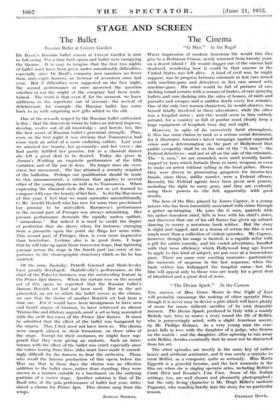The Cinema
"G Men." At the Regal WHAT impression of modern American life would this film give to a Robinson Crusoe, newly returned from twenty years on a desert island ? He would stagger out of the cinema half deafened, wondering how it could be that anyone in the United States was left alive. A kind of civil war, he might suppose, was in progress between criminals in fast cars armed with machine-guns and detectives in fast cars armed with machine-guns. His mind would be full of pictures of cars dashing round corners with a scream of brakes, of cars spraying bullets and cars dashing into the sides of houses, of raids and pursuits and escapes and a sudden death every few minutes. One of the only two women characters, he would observe, was herself fatally involved in these adventures, while the other was a hospital nurse ; and this would seem to him entirely natural, for a country so full of gunfire must clearly keep a huge equipment of hospitals busy day and night.
However, in spite of its excessively lurid atmosphere, G Men has some claims to rank as a serious social document, for it illustrates America's latest campaign against organized crime and a determination on the part of Hollywood that public sympathy shall be on the side of the " G men "—the Federal detectives—and not at all on the side of the criminals. The " G men," we are reminded, were until recently handi- capped by laws which forbade them to carry weapons or even to make an arrest without calling in the local police. Hence they were driven to prosecuting gangsters for income-tax frauds, since these, unlike murder, were a Federal offence. Recently the Federal agents have been given new powers, including the right to carry guns, and they are evidently using these powers to the full, apparently with good results.
The hero of the film, played by James Cagney, is a young lawyer who has been innocently associated with crime through a gutter up-bringing. He joins the G men, quarrels with his rather truculent chief, falls in love with his chief's sister, and discovers that one of his old flames has given Up cabaret dancing to marry a notorious bank robber. But the story is slight and ragged, and as a drama of action the film is not much more than a collection of violent episodes. Mr. Cagney, however, though his range is limited, is a capable actor with a gift for satiric comedy, and his varied adventures, handled with that terse efficiency which Hollywood long ago learnt to apply to this kind of subject, are put over at a tremendous pace. There are some. very exciting moments—particularly the moments of suspense in the last sequence, when the bank robber has kidnapped the hospital nurse—but the film will appeal only to those who are ready for a great deal of bloodshed and a great deal of noise.
"The Divine Spark." At the Curzon THE success of Miss Grace Moore in One Night of Love will probably encourage the making of other operatic films, though it is never easy to devise a plot which will leaYe plenty of room for music without sacrifice of • its Cniii dramatic interest. The Divine Spark, produced in Italy with a mainly British cast, tries to. weave a story round the life Of Bellini, who is perseveringly acted,- with a slight American' accent,' by Mr. Phillips Holmes. As a very young man the com- poser falls in love with the daughter of a judge, who frowns on the match ; and the daughter, after agreeing to run away with Bellini, decides eventually that he must not be distrieted from his art.
The other episodes are mostly in the same key of ,rather heavy and artificial sentiment, and it was surely a mistake to treat Bellini, as a cornPoaer, quite so seriously. Miss Marta Eggerth is a graceful heroine, and the best moments in the film are when she is singing operatic arias, including Bellini's Carta Diva and Rossini's Una Voce. Some of the Italian settings, too, are well chosen and pleasantly photographed ; but the only living .character is Mr. Hugh Miller's sardonic Paganini, who wanders briefly into the story for no, particular reason. , CHARLES DAVY.








































 Previous page
Previous page